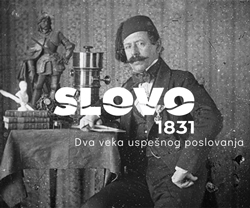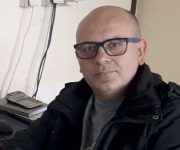Serbia must know what it will be when it “grows up”, whether it will withdraw into its shell and live isolated or go into the world and join the European Union, Alessandro Merola, Italian Ambassador in Belgrade says
One thing is certain: in Serbia, at least since I have been here, the situation is constantly changing. I could start enumerating, but I will confine myself only to Montenegro, Kosovo, and the new constitution and the past elections”.
Italian Ambassador in Belgrade Mister Alessandro Merola, with whom I talked on Wednesday, 22 February, dedicated a great part of his exposition to the issue of forming a new government in Belgrade.
Knowing how important it is for each country to have a stable and credible government, the respected interviewee of “Magazin Biznis” pointed out that for Serbia now the most important thing is to “find itself”, that is, to form a government as soon as possible, but not merely to overcome the political crisis of the moment, but to reach a solid and long-term solution. The very existence of a government, he considers, does not mean much. It is important what it will be like- temporary or stable. Therefore, regardless of the need of forming the government as soon as possible, he says, it is better to negotiate longer but get a solid government. Last elections have, says our interviewee, shown that almost a third of voters are made of those who do not have a great love for Europe, and those are, in his opinion, nostalgic people who still long for socialism. There are, however, a far greater number of those who opt for a more pronounced opening up towards the world, for European and Atlantic integrations. There are, therefore, two visions of Serbia, and which will be accepted depends solely on you, that cannot be imposed by anyone from outside, Ambassador Merola points out.
Although the first part of our conversation was dedicated to the forming of government, it was by no means a “political conversation”, because everything the Italian ambassador said regarded, primarily, the economy issues. For the economy to function properly certain rules must be known, it must be known what the strategic aims are and in which way they are to be achieved. That is determined by the government and therefore if there is no government with clear goals all the participants in the economic life of the country remain confused and insecure. To the same extent that goes for the potential foreign partners. No one will come to the market of a country where the rules of behaviour are not known. If a foreign investor has the intention of investing his or her capital in a country he or she primarily analyses the political and legal order in it, trying to understand if he or she is entering into the risk or the guaranteed stability zone. If he or she is convinced that the government of the country in which he or she intends to invest his or her capital is stable, the foreign investor will not have second thoughts. If the opposite is the case, he or she will wait and look for another destination.
Regardless of all the difficulties which Serbia was going through in the past few years, Ambassador Merola consider that the government which has led the country so far has, notwithstanding, done much. In order to ensure the continuity of reforms commenced, it is necessary, he considers, for the new government to be even more dynamic and efficient and to bravely face many yet unsolved problems. The social price of transition is high, transition is also painful on the human, psychological level but that is simply inevitable.
“Serbia”, Ambassador Alessandro Merola says” simply must know what it will be when it grows up. Will it withdraw into its shell and live isolated or go into the world, join the European Union? In my opinion, Serbia is highly suitable for joining the EU. For many reasons, but I will remind of only one, perhaps the most significant reason. It is, simply, geographically directed to that. Serbia is really in an ideal spot, the East- West but also North-South roads run across it. There is also the Danube which flows through the European continent. The very geographical position gives Serbia the privilege to distinguish itself as a country, whose strategic goal would be the building of a solid core of transportation, service infrastructures in the function of transportation, energetics, communications, information technologies… The construction of the appropriate logistic and service infrastructures in the function of transportation, information technologies and energetics should, I believe, be Serbia’s priority. Agriculture is also what could make Serbia stand out, but for that it is necessary to have the appropriate infrastructure: a good road network, airports, silos, big meat, fruit and vegetable cold storage plants, motels and hotels, marines alongside Danube…”
As far as the bilateral cooperation between Serbia and Italy is concerned, it is, Ambassador Merola says, excellent. But he immediately adds that it is by no means to say that it cannot be much better. “It surely can! The two countries have mutually complementary economies, traditionally friendly relations, are simply directed to one another and that should be made use of to the utmost. All efforts so far for Serbia to be represented to the Italians in the appropriate way, and I also have the two big economy manifestations “Italy in Belgrade” in mind, held in the past years, have given good results, but that is not enough. Serbia should be promoted even more as a country attractive for foreign partners, but our representatives also could get even more involved. Big Italian banks present here, to say the truth, for only a year, have in a short while, nevertheless, managed to win almost thirty percent of the Serbian banking market. After this first phase of entry on this market, now it is time for them also to take up the role of the promoters of the Serbian economy and to do so in Italy, getting the Italian businessmen acquainted with the opportunities that Serbia provides.
If Serbia got a government which would be brave and efficient in taking a unified attitude regarding its strategic aims, everything would improve. Foreign partners and potential investors would know with whom and what to talk about. The country that has due to the well known facts gone through a longer period of severe trials must be aware that there is no time to be lost any longer. It would be terrible that because of a possible misunderstanding of political parties the government is not formed and that there are elections again. That would mean that this year would be lost”.
Ambassador Alessandro Merola also talked about new initiatives which would, regarding support to Serbia, be made by his country. Of course, under the assumption that in Belgrade a new government is formed soon.
“We are prepared, with the aim of further affirmation of the Serbian economy and of all your potentials, to organize during this year a big promotion manifestation. Italian experts on the local circumstances would be talking about how important the cooperation of Serbia and Italy is and what Serbia could mean in future for Europe. We would likewise organize a big symposium dedicated to transportation, infrastructure and logistics: in those areas Serbia, due to its geographical position but also due to many other advantages, could become one of the indispensable crossroads in Europe”.
Throughout our conversation I was under the strong impression that Ambassador Alessandro Merola, exactly the same as his predecessors on the post, truly loves and respects our country and wishes it to develop faster and more efficiently. He would like Serbia to be stronger and more prosperous, that is, as he at one point said, to see it as grown up.
Slobodan Aleksendrić
















